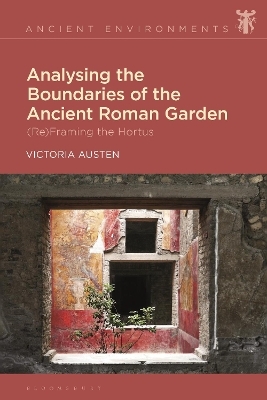
Analysing the Boundaries of the Ancient Roman Garden
(Re)Framing the Hortus
Seiten
2024
Bloomsbury Academic (Verlag)
978-1-350-26522-6 (ISBN)
Bloomsbury Academic (Verlag)
978-1-350-26522-6 (ISBN)
This book demonstrates how the Romans constructed garden boundaries specifically in order to open up or undermine the division between a number of oppositions, such as inside/outside, sacred/profane, art/nature, and real/imagined. Using case studies from across literature and material and visual culture, Victoria Austen explores the perception of individual garden sites in response to their limits, and showcases how the Romans delighted in playing with concepts of boundedness and separation.
Transculturally, the garden is understood as a marked-off and cultivated space. Distinct from their surroundings, gardens are material and symbolic spaces that constitute both universal and culturally specific ways of accommodating the natural world and expressing human attitudes and values. Although we define these spaces explicitly through the notions of separation and division, in many cases we are unable to make sense of the most basic distinction between ‘garden’ and ‘not-garden’. In response to this ambiguity, Austen interrogates the notion of the ‘boundary’ as an essential characteristic of the Roman garden.
Transculturally, the garden is understood as a marked-off and cultivated space. Distinct from their surroundings, gardens are material and symbolic spaces that constitute both universal and culturally specific ways of accommodating the natural world and expressing human attitudes and values. Although we define these spaces explicitly through the notions of separation and division, in many cases we are unable to make sense of the most basic distinction between ‘garden’ and ‘not-garden’. In response to this ambiguity, Austen interrogates the notion of the ‘boundary’ as an essential characteristic of the Roman garden.
Victoria Austen is Assistant Professor at University of Illinois Urbana-Champaign, USA. She received her PhD in Classics from King’s College London, UK.
List of Figures
Acknowledgements
Introduction: Defining Garden Space
Chapter 1: Setting the Framework
Chapter 2: Who has the time? Virgil, Columella, and Hortus Poetry
Chapter 3: Augustus’ Garden Room? Re-Framing the Ara Pacis Augustae
Chapter 4: Distinguit et Miscet: Framing Roman Villa Gardens
Conclusion: Seneca’s Thyestes and the Anti-Garden
Notes
Bibliography
Index
| Erscheinungsdatum | 03.09.2024 |
|---|---|
| Reihe/Serie | Ancient Environments |
| Zusatzinfo | 30 bw illus |
| Verlagsort | London |
| Sprache | englisch |
| Maße | 156 x 234 mm |
| Themenwelt | Sachbuch/Ratgeber ► Natur / Technik ► Garten |
| Geisteswissenschaften ► Archäologie | |
| Geschichte ► Allgemeine Geschichte ► Vor- und Frühgeschichte | |
| Geschichte ► Allgemeine Geschichte ► Altertum / Antike | |
| Geisteswissenschaften ► Sprach- / Literaturwissenschaft ► Anglistik / Amerikanistik | |
| Geisteswissenschaften ► Sprach- / Literaturwissenschaft ► Literaturwissenschaft | |
| Naturwissenschaften ► Geowissenschaften | |
| ISBN-10 | 1-350-26522-5 / 1350265225 |
| ISBN-13 | 978-1-350-26522-6 / 9781350265226 |
| Zustand | Neuware |
| Informationen gemäß Produktsicherheitsverordnung (GPSR) | |
| Haben Sie eine Frage zum Produkt? |
Mehr entdecken
aus dem Bereich
aus dem Bereich
Was Pompeji über uns erzählt
Buch | Hardcover (2023)
Propyläen (Verlag)
CHF 44,75
auf den Spuren der frühen Zivilisationen
Buch | Hardcover (2023)
C.H.Beck (Verlag)
CHF 27,95


